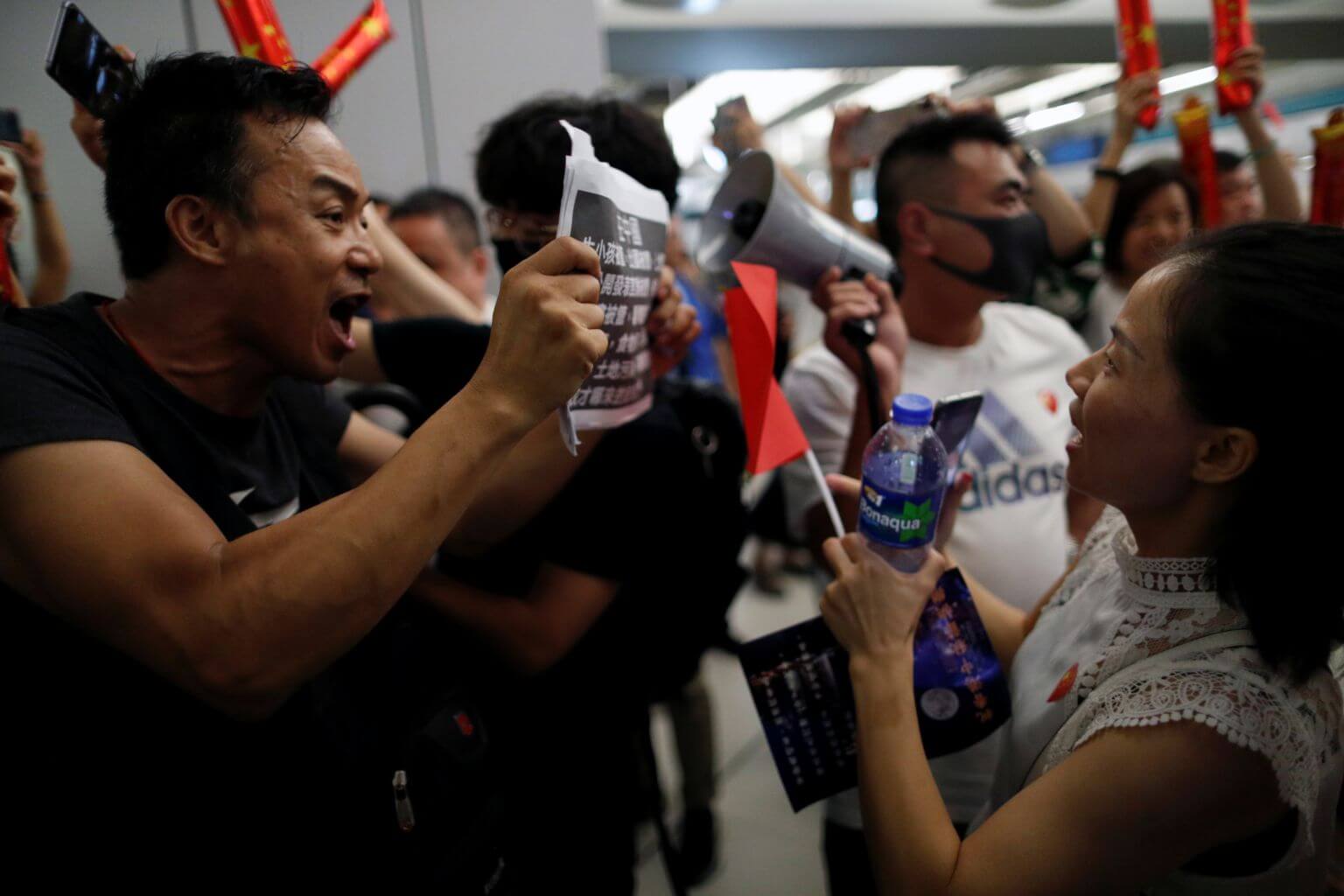Hong Kong unrest rocks insurance industry as Chinese buyers baulk
Sign up now: Get ST's newsletters delivered to your inbox

A pro-China demonstrator (right) engages in a skirmish with an anti-government group at Yuen Long station in Hong Kong, on Sept 12, 2019.
PHOTO: REUTERS
Follow topic:
HONG KONG (BLOOMBERG) - One of the biggest sources of demand for Hong Kong insurance products is drying up as the city's summer of unrest deters Chinese buyers.
A group of about 80 agents working for one insurer saw their team's sales to visitors from mainland China fall by almost 30 per cent in August from the previous year, according to a senior member of the group.
Sales for September are on track for another tumble, the person said. Two other agents in the city said their business had also fallen steeply after anti-government protests intensified. They all asked not to be named discussing private information.
Chinese customers have long flocked to Hong Kong for insurance sold by the likes of Prudential and AIA Group, in part because the products offer an investment component and payouts in foreign currencies that are hard to come by on the mainland.
But many prospective Chinese customers are now avoiding the former British colony after protesters disrupted transport services and engaged in violent clashes with police.
That is pummelling insurance sales because industry rules require policyholders to be physically present in the city before a contract can be finalised.
In one sign of how big the issue has become for insurers, Prudential this month arranged mobile processing centres in conference rooms at a hotel near Hong Kong's airport, allowing visitors to sign their contracts without venturing into the city, according to a company memo seen by Bloomberg News.
It is unclear whether the move will alleviate customers' concerns, given that the airport has also been rocked by protests in recent weeks.
Few expect the city's turmoil to end anytime soon, even after Hong Kong Chief Executive Carrie Lam last week gave in to one of the protesters' demands by scrapping the extradition Bill that initially drew people onto the streets three months ago.
The risk for Hong Kong's insurance industry is that an enduring period of unrest undermines the city's reputation as a safe and reliable provider of financial services.
"If this drags out more than a couple of quarters, it would do serious damage," said Mr Steven Lam, an analyst at Bloomberg Intelligence in Hong Kong.
A Prudential spokesman in Hong Kong confirmed the contents of the company's memo, while declining to comment further. An AIA spokesman declined to comment.
The protests have thrown a wrench in what Hong Kong insurance agents - some of whom quit careers in banking to join the lucrative industry in recent years - had expected to be a strong 2019.
New premiums from policies sold to mainland visitors increased 18 per cent to HK$26.3 billion (S$4.62 billion) in the first six months of the year from the same period of 2018, accounting for 26 per cent of total new premiums from individuals, according to Hong Kong's Insurance Authority.
If not for the unrest, sales would have been expected to remain robust as the Chinese yuan slumped, a move that typically increases demand for foreign-currency policies.
Instead, Chinese buyers have stayed at home as protesters blocked roads and clashed with police in districts such as Tsim Sha Tsui and Causeway Bay, where many insurers operate customer-service centres catering to tourists.
The number of Chinese group tours to Hong Kong fell 90 per cent in the first 10 days of September versus the same period last year, following a 63 per cent drop in August, according to data compiled by the Travel Industry Council of Hong Kong.
Prudential shares, which climbed 28 per cent this year through early July in London, have since dropped about 17 per cent. AIA has slumped almost 11 per cent from its July high in Hong Kong.
"Recent discussions with investors suggest that they remain highly concerned about the impact that HK protests could have on AIA Group's value of new business," Mr Michael Chang, an analyst at CGS-CIMB Securities, wrote in a note on Tuesday (Sept 10). "Our recent visit to mainland China suggests strong belief among people living in mainland China that it is currently unsafe to visit HK, and they are delaying or cancelling travel plans."

